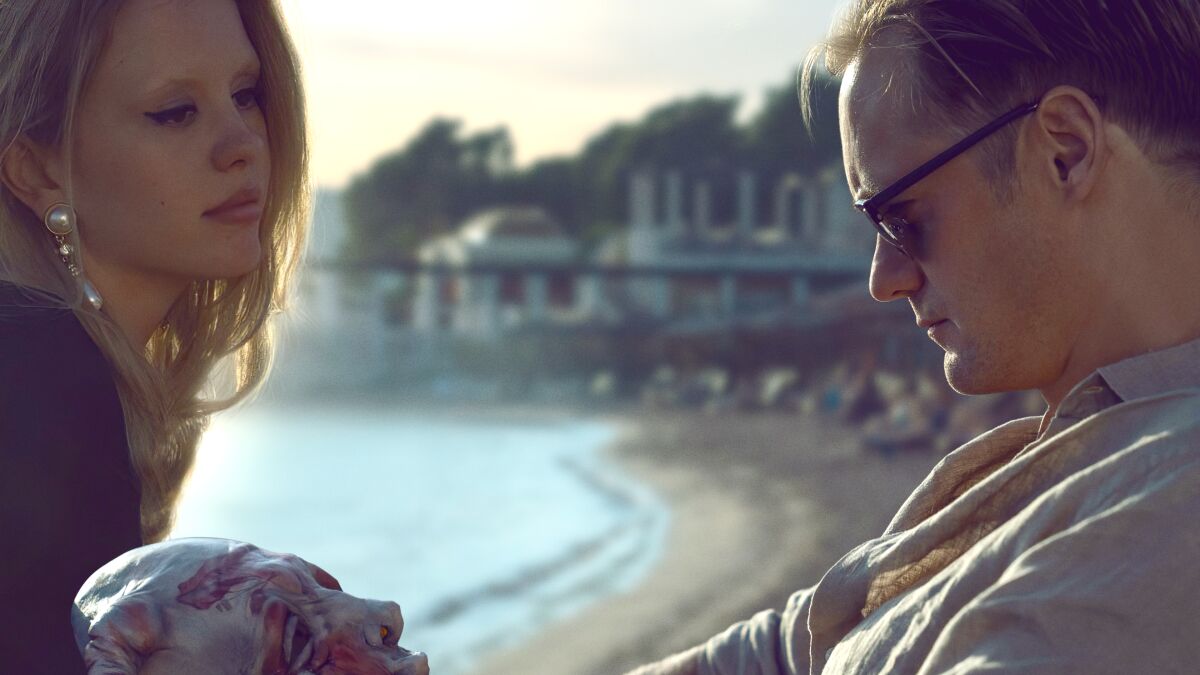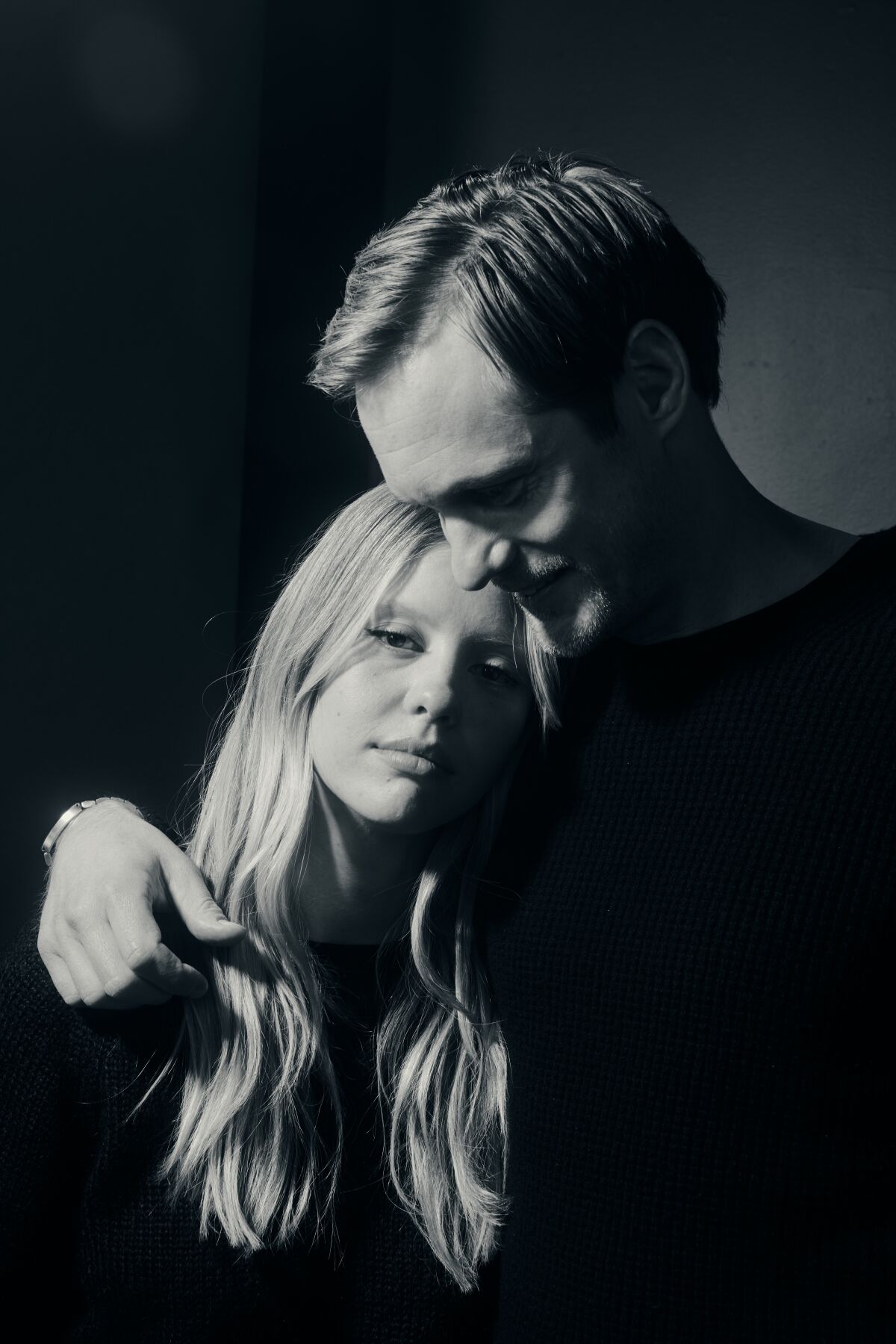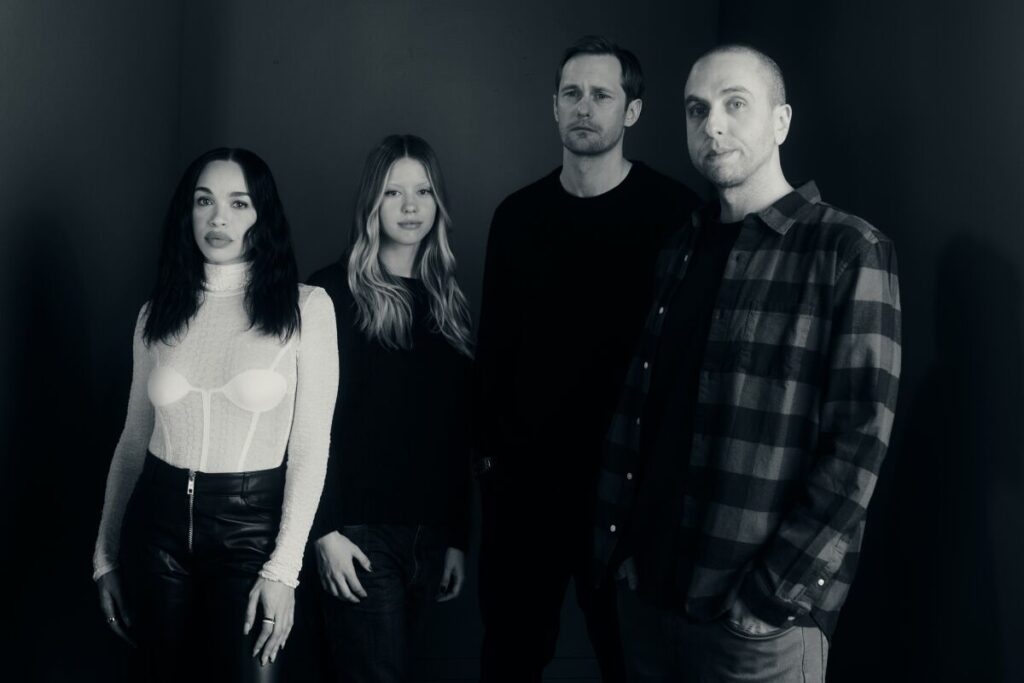Over three feature films, Brandon Cronenberg has carved out a distinctive style for himself, a blend of horror and sci-fi that musters an all-too-rare audience response of genuine shock. His latest film, “Infinity Pool,” may be the most disturbing and unsettling film at Sundance this year, forcing viewers to confront what they might actually be capable of — all told in a hallucinatory, brain-melting, head-spinning style.
In the film, James (Alexander Skarsgård) and his wife Em (Cleopatra Coleman) go on holiday to a remote all-inclusive resort in hopes of breaking through his writer’s block. Since the publication of one book some years ago, James has been unable to finish anything else and essentially lives off Em’s family money.
After they meet the enigmatic Gabi (Mia Goth), they go with her for an excursion outside the resort grounds. When James kills someone with a car in an accident, he is faced with the decision of whether to be executed or pay to have an exact double of himself created and killed in his place. This leads James into a decadent underworld that forces him to face himself in unexpected ways.
Shot in Croatia and Hungary, the film is reminiscent of, but not quite analogous to other recent projects skewering the blinkered lives of the wealthy and privileged such as “Triangle of Sadness,” “Succession,” “Glass Onion,” “The Menu” or “The White Lotus.” Cronenberg’s film is too psychotronic and just plain weird for that, obsessed as it is with death and depravity alongside responsibility and accountability.
Ahead of the festival, Cronenberg and Goth joined The Times on a video call together, while Skarsgård was interviewed separately due to his shooting schedule on the next season of “Succession.”
Skarsgård had been told good things about Cronenberg before the shoot by his friend Andrea Riseborough, who starred in Cronenberg’s previous film, “Possessor.” Yet Skarsgård still wasn’t prepared for the person he encountered compared to the movies that Cronenberg makes.
“He’s such a gentle, sweet, unassuming guy. So humble,” said Skarsgård. “And the fact that he comes up with these crazy, twisted, dark, hedonistic stories, maybe it’s his way of conducting therapy, that it’s cathartic in the way that dark s— comes out in his writing. Because he’s definitely not what I expected when I met him.”
As Goth put it, “One of the things that I love about Brandon’s movies is the fact that it’s not a sit-back-and-relax type of experience. Rather, you watch his movies and it’s lean-in and-engage. From the very first scene you are locked in.”
Cleopatra Coleman, from left, Mia Goth, Alexander Skarsgard and Brandon Cronenberg at the Los Angeles Times Studio at the Sundance Film Festival.
(Mariah Tauger / Los Angeles Times)
Brandon, did you go on a bad vacation? Was that the initial impulse behind the story?
Brandon Cronenberg: I did go on a bad vacation. Is it that obvious? Honestly, it was kind of a mashup. Quite a while ago, I’d been writing a short story specifically about the clone executions. It was essentially the first execution scene as a story. And when I started expanding it, I ended up coming back to memories of this weird vacation that I’d had many years ago. The only time I went to a traditional all-inclusive resort, I think it was in the Dominican Republic. The thing about that trip was that they would bus you in in the middle of the night to this resort compound. You just step off the bus into this completely enclosed compound that was actually encased by razor-wire fences hidden by palm leaves. And you were stuck on this compound. There was kind of a fake town that you could buy stuff at. And the Chinese restaurant and the guy on the ATV were from that vacation.
And then at the end of the week, they’d drive you back during the day and you would see that actually there was this really incredible poverty just beyond the resort, the people living in shacks. And it was obviously a very disturbing and grotesque contrast. But also there’s something so completely surreal about the experience because it’s almost like you were visiting a completely separate state other than the host state. It was like a completely different world or another dimension that had sort of popped up in this country, like a weird growth. And the fact that inside that growth you existed in this complete Disneyland version of reality was surreal. And it felt like a good setting for this story about consequence-free characters.

Mia Goth and Alexander Skarsgård in ‘Infinity Pool.’
(Neon)
Mia, what appealed to you about the story when it was first presented to you?
Mia Goth: I was in the middle of filming “Pearl,” actually. And that shoot was really intense. We were doing six-day weeks and like 12-, 14-, 15-hour days, and regardless of all that, the first Sunday I had off, I woke up, I had my breakfast, I had my coffee, and the first thing I did was I opened the script and started reading it. And I knew about four pages in. I was like, “Wow, this is wild. I have to do this.” … I love Gabi. Reading the script the first time around, she even fooled me. She presents herself in so many different ways within the movie, and I thought she was going to be one thing and she took me on this wild ride with her.
Alexander, coming after “The Northman,” this feels like such a huge pivot, to play this character that’s so weak and humiliated throughout the movie. This is not a typical leading man part at all.
Alexander Skarsgård: “The Northman” was such a monumental, thrilling and exhausting experience. It was arguably the most rewarding creative experience of my life. But I was completely drained after that, because not only did we spend almost a year shooting “The Northman,” but it was many years in the making and developing the movie and living with that character in that world. I read “Infinity Pool” when we were shooting “The Northman” in Northern Ireland, so it was towards the tail end of the shoot. And just reading something that was tonally so different, a character that wasn’t a hero, or had any of those alpha-male qualities. He definitely wasn’t a leader of men and he definitely had lower levels of testosterone than Amleth on “The Northman.” And that really excited me. It was just so fun to imagine going into that after “The Northman.”
Brandon, I found the movie to be so destabilizing, I felt genuinely emotionally unmoored when it was over. How do you describe that? What to you is the tone of the movie?
Cronenberg: I don’t really describe the tone of the movie, is the answer. And I sort of don’t want to, because I feel to a certain degree you want the audience to explore. Certain kinds of filmmaking end up working as laboratories for the mind to explore these difficult emotions and feelings. And to me that’s why I like this kind of filmmaking. I like being put in a position where you are destabilized when you’re watching a film. I think that kind of art is more transformative, taking you to places that might be difficult but also that allow you to engage with aspects of your brain that you might not in a day-to-day way. I think that’s really healthy. And I think that’s something that I really like in art. So I don’t want to tell people what the tone is. I think that’s something sort of hard to categorize, but I also don’t want to paint the film as being something in particular for people. I want them to have a chance to explore it on their own and define it for themselves.
How do you conceive of the actual mechanics of how the doubling process occurs? Do you like taking this sort of fantastic idea and making it as much of a reality as you can?
Cronenberg: Yes, although I’d say in this film, it’s deliberately a bit absurd and not really meant to be a convincing hard sci-fi movie about cloning technology. It’s really kind of like magic realism, or in that spirit, because it’s more of a metaphorical point. I mean, why would this technology exist only in this country? It’s not meant to make sense in a kind of literal sci-fi world-building way. It’s meant to be a little bit dreamlike and strange to then be able to get to the other stuff. And of course it’s fun to design it.
And some of the designs came from our experiences location hunting. We were in countries that actually had histories of authoritarianism and communism. We shot in this old power station. The exterior of it was an aesthetic that we borrowed from the location. And so it was very much defined by our experiences over there, rather than something that was totally designed and then forced into.
Goth: That power station was amazing. That was one of my favorite shooting locations I’ve ever been on. I’ve never seen anything like that. It was huge. And still strangely intact.
Skarsgård: I love the way they designed all that because it felt very rudimentary and rough. Because when you think of the fact that they’re capable of cloning a body, you would imagine it to be in a more futuristic, sci-fi environment where it’s this very austere, clean lab and they do it in a high-tech, cool fashion with computers and stuff. But this is very manual and very analog with big hoses and weird s—. I thought that was a really interesting choice by Brandon to go in that direction instead of making it look futuristic. It was all like a dirty old East European factory.

Mia Goth and Alexander Skarsgård at the Los Angeles Times Studio at the Sundance Film Festival.
(Mariah Tauger / Los Angeles Times)
Mia, there’s a moment in the movie where you’re lying on the hood of a car as it’s slowly moving and you’re eating from a bucket of chicken as Alex walks in front of the car. That image is really absurd but also really unnerving. Did that moment stick out to you?
Goth: Yes, because it’s a wild scene. But really every day on Brandon’s set felt like I was sitting on the hood of a car eating a bucket of chicken.
Cronenberg: Can we put that on the Blu-ray? Could that be a cover quote?
Goth: What I mean by that is Brandon as a director is so trusting and he gives so much freedom to his actors and it’s such a joy to work with a director like that. Really I think that’s the sign of a great director, someone who chooses their actors and feels that they’re appropriate for the role and then after that they’re really able to kind of release control of the character and just let that actor explore and play with it and ultimately have a lot of fun with it. And so there wasn’t a dull day on set. Every day there was a different adventure, there was a different wild situation that we were finding ourselves in. And so I guess the scene with the chicken is kind of the climax of what the whole shooting experience was.
Skarsgård: That scene was a fantastic day. When we get into that, when he tries to get away, it’s also kind of weird and pathetic and sad and there’s that fight and she’s just laughing at him. It’s just this really humiliating moment for him — most of the movie is humiliating, just like a sequence of humiliation moments for him. But I just remember turning around, looking at Mia having a little picnic on the hood as they’re slowly driving by. She’s so funny in that scene.
Brandon, I had the pleasure of talking to your father, David Cronenberg, last year when his movie “Crimes of the Future” was coming out, and he talked about how excited he was that when he was shooting his movie in Greece, you weren’t that far away shooting your movie in Croatia. Was it fun for you to be close to him while you were both shooting?
Cronenberg: It was cute. I think he had a better hat than I had though, so that was a little bit uncomfortable for me.
Like his onset directing hat?
Cronenberg: His onset directing hat was much better than mine, from what I understand. So that was maybe a problem.
Unlike a lot of people who come from notable families, you seem quite open about being influenced by your father’s work. You don’t seem to mind people comparing them. Was it difficult for you to acknowledge your father’s influence on your own work?
Cronenberg: I don’t know if I’ve necessarily acknowledged it. That’s a bit of a loaded question. It was always going to be the case when I got into movies and I didn’t want to worry about it because I think deliberately avoiding anything that would be considered related to his work would be defining my own art in relation to his art. And I actually don’t want to do that. So for my own work, I’m just following my own interests and preoccupations and if there’s some overlap, we’re related — I guess that’s natural.

